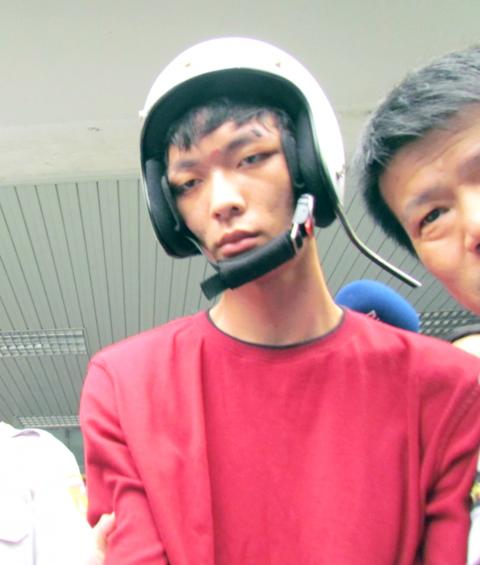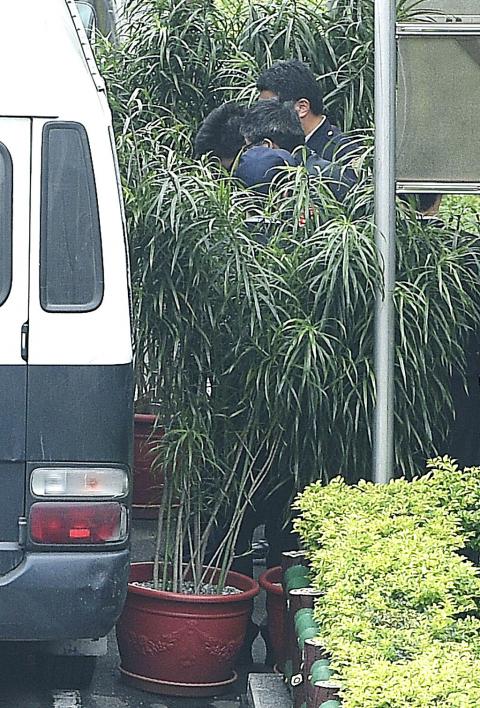The New Taipei City District Court collegiate bench yesterday found MRT killer Cheng Chieh (鄭捷) guilty on four counts of murder and 22 counts of attempted manslaughter, handing down four death sentences and prison sentences ranging from five to eight years, amounting to a total jail term of 144 years.
Cheng’s citizen’s rights have also been revoked for life.
The ruling may be appealed, the court said.

Photo: CNA
Cheng, then a student of Tunghai University, attacked passengers on Taipei’s MRT metro rail system on May 21 last year on the Bannan Line between Longshan Temple Station and Jiangzicui Station. He killed Hsieh Ching-yun (解青雲), Chang Cheng-han (張正翰), Lee Tsui-yun (李翠雲) and Pan Pi-chu (潘碧珠), and injured 22 others.
Cheng had initially said that he was tired of life, but was afraid of committing suicide, so he committed multiple counts of murder so that he would be assured of capital punishment.
The court found that Cheng did not exhibit signs of psychotic abnormalities or mental deficiencies at the time of his actions.

Photo: Chen Chih-chu, Taipei Times
Central Police University professor Shen Sheng-ang (沈勝昂) said the possibility of Cheng being rehabilitated was unlikely, adding that “Cheng’s situation is akin to that of a terminal-stage cancer patient.”
Cheng’s initial aloofness and silence, as well as his failure to apologize to the victims’ families, saw an abrupt turn on Feb. 10, when he broke his silence to say he would undergo psychiatric consultation and would not resort to violence and murder again if given the chance for parole.
According to sources, Cheng’s sudden change in attitude was due to his belief that he could accept a life sentence and perhaps make a living by starting a small business if he were to be released on parole.
One source quoted Cheng saying to his friends that “[If I] win [the case], we’ll have the chance of living our lives as we like; [if I] lose, we’ll meet in another life as heroes.”
Cheng’s lawyers sought to rationalize his attitude after the killings by saying that his thinking was like that of a teenager, believing that if he showed any regret, he would lose face.
That is why he seemed aloof, although he knew what he did was wrong, they said.
“We understand that the court is under great pressure from the media, but trying to demonize the defendant will not help society,” Cheng’s lawyers said in a statement.
His lawyers also criticized the presiding judges, saying that the court violated their client’s rights by forcing him to attend court to hear the ruling, as he was not by law mandated to be present.
“By forcing our client to appear at court simply for maximum media effect, the judges have lost focus and have endangered the equality and uniformity of the law, creating an exception that might be followed in future cases,” the lawyers said.
Meanwhile, family members of the victims said that the ruling was in accordance with the public’s expectations, but they could not condone the comments from Cheng’s lawyers.
Lee’s brother Lee Jui-chang (李瑞昌) said he was glad the New Taipei City District Court judges were just, and that he hoped judges in the appellate courts would continue to uphold the ruling.
The reasons cited by the lawyers for the murders sought to deny Cheng’s responsibility in the matter, Lee Jui-chang said, adding that he hoped the day for the final ruling on Cheng’s capital punishment could be expedited.
Additional reporting by CNA

CHAOS: Iranians took to the streets playing celebratory music after reports of Khamenei’s death on Saturday, while mourners also gathered in Tehran yesterday Iranian Supreme Leader Ayatollah Ali Khamenei was killed in a major attack on Iran launched by Israel and the US, throwing the future of the Islamic republic into doubt and raising the risk of regional instability. Iranian state television and the state-run IRNA news agency announced the 86-year-old’s death early yesterday. US President Donald Trump said it gave Iranians their “greatest chance” to “take back” their country. The announcements came after a joint US and Israeli aerial bombardment that targeted Iranian military and governmental sites. Trump said the “heavy and pinpoint bombing” would continue through the week or as long

TRUST: The KMT said it respected the US’ timing and considerations, and hoped it would continue to honor its commitments to helping Taiwan bolster its defenses and deterrence US President Donald Trump is delaying a multibillion-dollar arms sale to Taiwan to ensure his visit to Beijing is successful, a New York Times report said. The weapons sales package has stalled in the US Department of State, the report said, citing US officials it did not identify. The White House has told agencies not to push forward ahead of Trump’s meeting with Chinese President Xi Jinping (習近平), it said. The two last month held a phone call to discuss trade and geopolitical flashpoints ahead of the summit. Xi raised the Taiwan issue and urged the US to handle arms sales to

State-run CPC Corp, Taiwan (CPC, 台灣中油) yesterday said that it had confirmed on Saturday night with its liquefied natural gas (LNG) and crude oil suppliers that shipments are proceeding as scheduled and that domestic supplies remain unaffected. The CPC yesterday announced the gasoline and diesel prices will rise by NT$0.2 and NT$0.4 per liter, respectively, starting Monday, citing Middle East tensions and blizzards in the eastern United States. CPC also iterated it has been reducing the proportion of crude oil imports from the Middle East and diversifying its supply sources in the past few years in response to geopolitical risks, expanding

OTHER OPTIONS: Given possible US intervention and Taiwanese counterattacks, China might opt to blockade Taiwan or take its outlying islands instead of an all-out invasion A US think tank has urged Taiwan to adopt a “hellscape” strategy that would flood the Taiwan Strait with drones and other uncrewed systems to deter invasion by China. In its report, Hellscape for Taiwan, published on Thursday, the Center for a New American Security said Taipei’s asymmetric defense approach — often described as a “porcupine strategy” — needs to evolve to keep pace with the growing capabilities of the Chinese People’s Liberation Army. The “hellscape” strategy involves saturating the air and waters around Taiwan with thousands of drones and other platforms capable of striking invading forces from multiple domains at once. Long-range